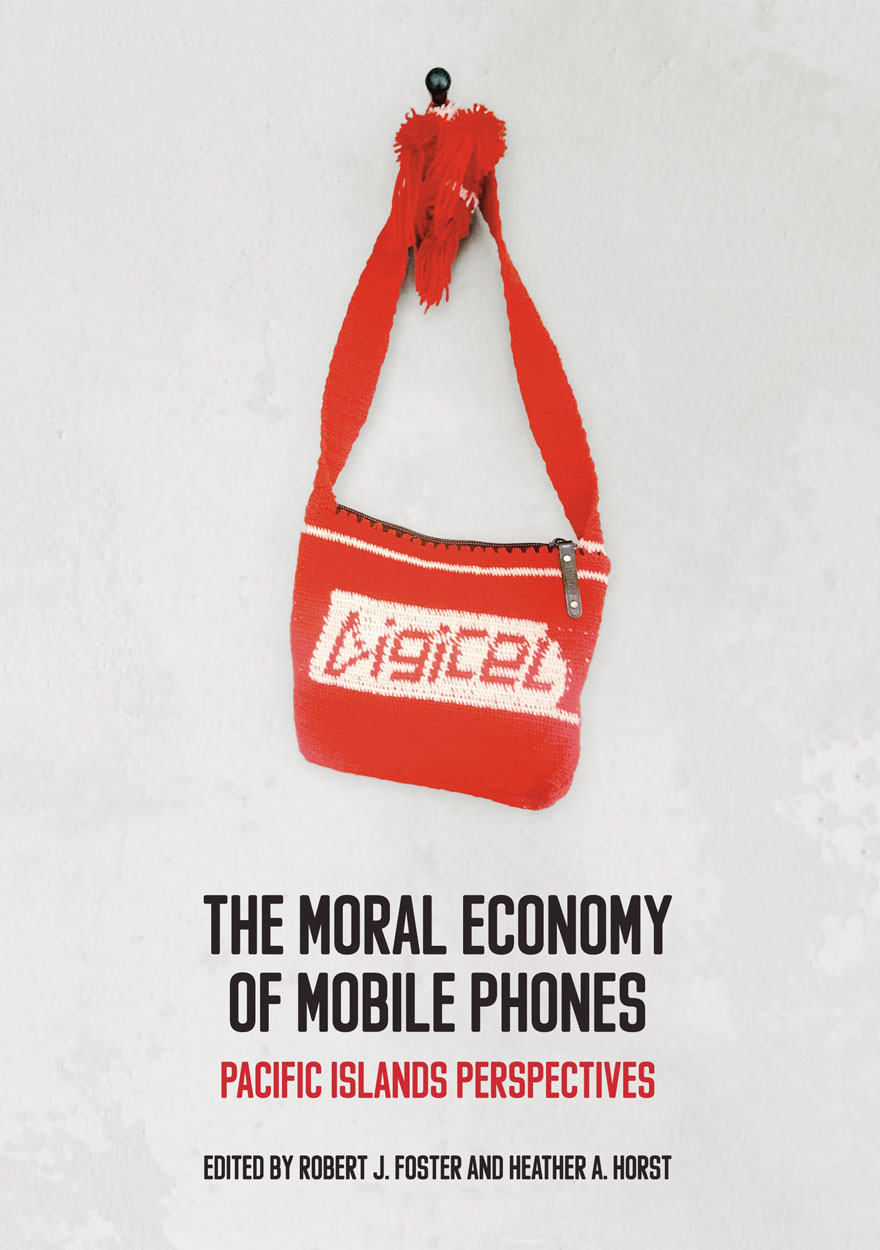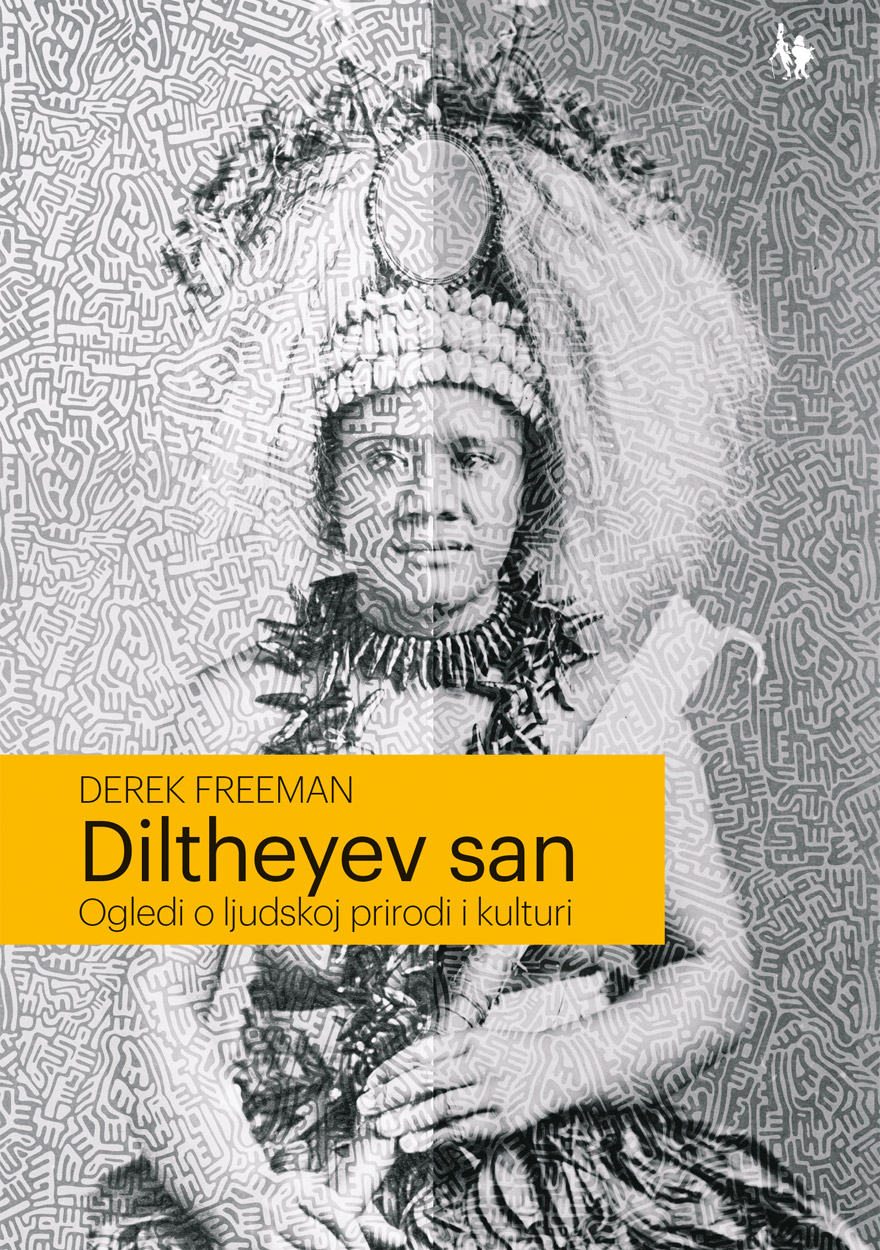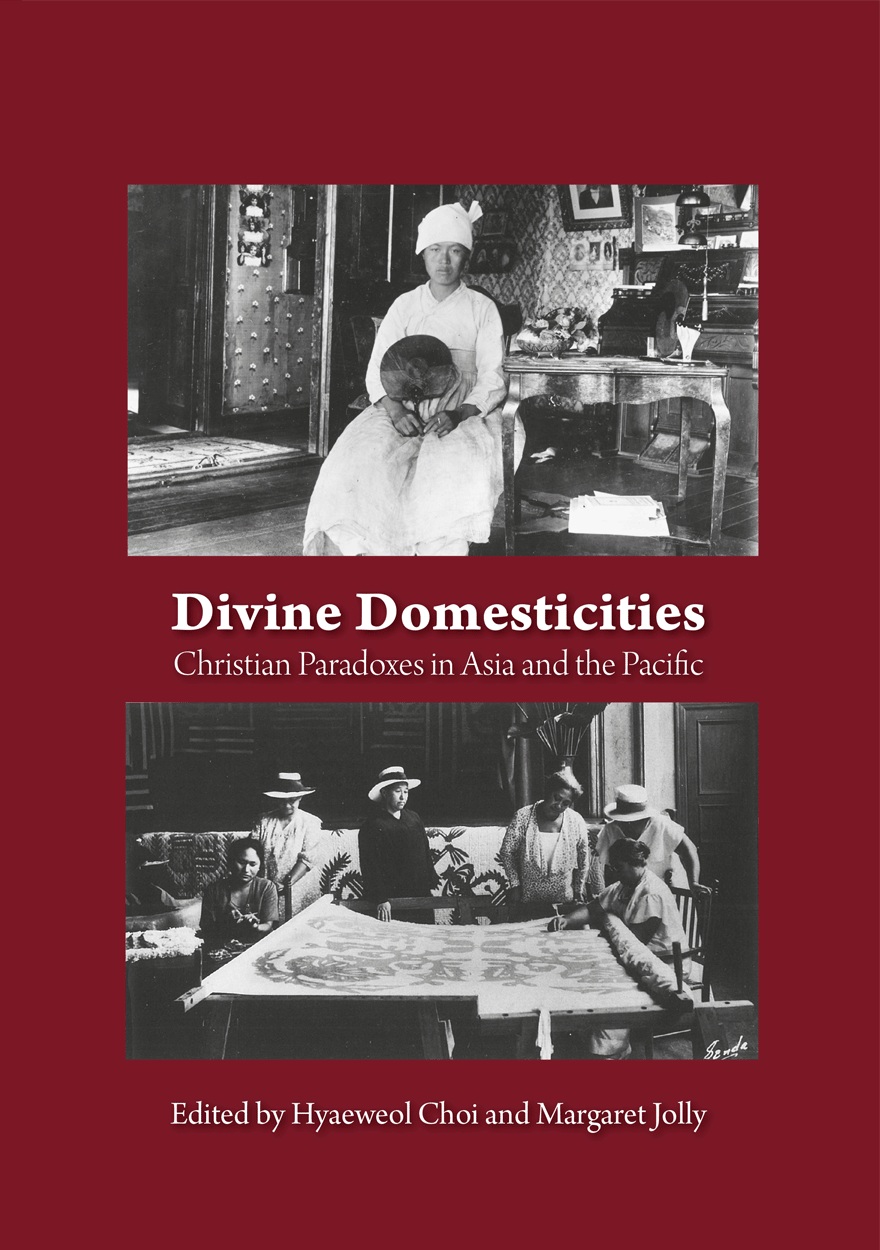Search titles
Displaying results 1 to 10 of 15.

The Moral Economy of Mobile Phones »
Pacific Islands Perspectives
Edited by: Robert J. Foster, Heather A. Horst
Publication date: May 2018
The moral economy of mobile phones implies a field of shifting relations among consumers, companies and state actors, all of whom have their own ideas about what is good, fair and just. These ideas inform the ways in which, for example, consumers acquire and use mobile phones; companies promote and sell voice, SMS and data subscriptions; and state actors regulate both everyday use of mobile phones and market activity around mobile phones. Ambivalence and disagreement about who owes what to whom is thus an integral feature of the moral economy of mobile phones. This volume identifies and evaluates the stakes at play in the moral economy of mobile phones. The six main chapters consider ethnographic cases from Papua New Guinea, Fiji and Vanuatu. The volume also includes a brief introduction with background information on the recent ‘digital revolution’ in these countries and two closing commentaries that reflect on the significance of the chapters for our understanding of global capitalism and the contemporary Pacific.

Dilthey’s Dream »
Essays on human nature and culture
Authored by: Derek Freeman
Publication date: April 2017
With great eloquence, Derek Freeman takes the reader on an intellectual journey through the complexities of philosophical anthropology. Even while the controversial Nature–Nurture debate raged, Freeman contended that the crucial fact that humans had the capacity to make choices was ‘both intrinsic to our biology and basic to the very formation of cultures’. Thus the scene was set for his widely publicised criticism of Margaret Mead’s book Coming of Age in Samoa. Publishing her research in 1926, Mead concluded that all human behaviour was the result of social conditioning. Freeman refuted this assumption in 1983, urging closer interactions between the biological sciences and cultural studies to bridge the ever-widening chasm threatening all studies of humankind.
Dilthey’s Dream is an engagingly powerful set of essays depicting the depth of one man’s thinking on issues, which consumed a lifetime.

Dilthey’s Dream (Croatian version) »
Essays on human nature and culture
Authored by: Derek Freeman
Publication date: July 2016
With great eloquence, Derek Freeman takes the reader on an intellectual journey through the complexities of philosophical anthropology. Even while the controversial Nature–Nurture debate raged, Freeman contended that the crucial fact that humans had the capacity to make choices was 'both intrinsic to our biology and basic to the very formation of cultures'. Thus the scene was set for his widely publicised criticism of Margaret Mead's book Coming of Age in Samoa. Publishing her research in 1926, Mead concluded that all human behaviour was the result of social conditioning. Freeman refuted this assumption in 1983, urging closer interactions between the biological sciences and cultural studies to bridge the ever-widening chasm threatening all studies of humankind.
Dilthey's Dream is an engagingly powerful set of essays depicting the depth of one man's thinking on issues, which consumed a lifetime.

Pacific Islanders Under German Rule »
A Study in the Meaning of Colonial Resistance
Authored by: Peter J. Hempenstall
Publication date: June 2016
This is an important book. It is a reprint of the first detailed study of how Pacific Islanders responded politically and economically to their rulers across the German empire of the Pacific. Under one cover, it captures the variety of interactions between the various German colonial administrations, with their separate approaches, and the leaders and people of Samoa in Polynesia, the major island centre of Pohnpei in Micronesia and the indigenes of New Guinea. Drawing on anthropology, new Pacific history insights and a range of theoretical works on African and Asian resistance from the 1960s and 1970s, it reveals the complexities of Islander reactions and the nature of protests against German imperial rule. It casts aside old assumptions that colonised peoples always resisted European colonisers. Instead, this book argues convincingly that Islander responses were often intelligent and subtle manipulations of their rulers’ agendas, their societies dynamic enough to make their own adjustments to the demands of empire. It does not shy away from major blunders by German colonial administrators, nor from the strategic and tactical mistakes of Islander leaders. At the same time, it raises the profile of several large personalities on both sides of the colonial frontier, including Lauaki Namulau’ulu Mamoe and Wilhelm Solf in Samoa; Henry Nanpei, Georg Fritz and Karl Boeder in Pohnpei; or Governor Albert Hahl and Po Minis from Manus Island in New Guinea.

New Mana »
Transformations of a Classic Concept in Pacific Languages and Cultures
Edited by: Matt Tomlinson, Ty P. Kāwika Tengan
Publication date: April 2016
‘Mana’, a term denoting spiritual power, is found in many Pacific Islands languages. In recent decades, the term has been taken up in New Age movements and online fantasy gaming. In this book, 16 contributors examine mana through ethnographic, linguistic, and historical lenses to understand its transformations in past and present. The authors consider a range of contexts including Indigenous sovereignty movements, Christian missions and Bible translations, the commodification of cultural heritage, and the dynamics of diaspora. Their investigations move across diverse island groups—Papua New Guinea, Solomon Islands, Vanuatu, Fiji, Tonga, Samoa, Hawai‘i, and French Polynesia—and into Australia, North America and even cyberspace. A key insight that the volume develops is that mana can be analysed most productively by paying close attention to its ethical and aesthetic dimensions.
Since the late nineteenth century, mana has been an object of intense scholarly interest. Writers in many fields including anthropology, linguistics, history, religion, philosophy, and missiology have long debated how the term should best be understood. The authors in this volume review mana’s complex intellectual history but also describe the remarkable transformations going on in the present day as scholars, activists, church leaders, artists, and entrepreneurs take up mana in new ways.

The Naturalist and his 'Beautiful Islands' »
Charles Morris Woodford in the Western Pacific
Authored by: David Russell Lawrence
Publication date: October 2014
‘I know no place where firm and paternal government would sooner produce beneficial results then in the Solomons … Here is an object worthy indeed the devotion of one’s life’.
Charles Morris Woodford devoted his working life to pursuing this dream, becoming the first British Resident Commissioner in 1897 and remaining in office until 1915, establishing the colonial state almost singlehandedly. His career in the Pacific extended beyond the Solomon Islands. He worked briefly for the Western Pacific High Commission in Fiji, was a temporary consul in Samoa, and travelled as a Government Agent on a small labour vessel returning indentured workers to the Gilbert Islands.
As an independent naturalist he made three successful expeditions to the islands, and even climbed Mt Popomanaseu, the highest mountain in Guadalcanal. However, his natural history collection of over 20,000 specimens, held by the British Museum of Natural History, has not been comprehensively examined. The British Solomon Islands Protectorate was established in order to control the Pacific Labour Trade and to counter possible expansion by French and German colonialists. It remaining an impoverished, largely neglected protectorate in the Western Pacific whose economic importance was large-scale copra production, with its copra considered the second-worst in the world.
This book is a study of Woodford, the man, and what drove his desire to establish a colonial protectorate in the Solomon Islands. In doing so, it also addresses ongoing issues: not so much why the independent state broke down, but how imperfectly it was put together in the first place.
David Russell Lawrence is an anthropologist who has managed environmental programs in Melanesia and Southeast Asia for the Great Barrier Reef Marine Park Authority. His most recent book was a re-examination of the place in Melanesian anthropology of the Finnish sociologist Gunnar Landtman who spent two years working with the Kiwai people of the lower Fly estuary. He recently managed a large-scale survey of 300 communities in the Solomon Islands for the Community Sector Program and has assisted with a number of the annual RAMSI People’s Surveys in the islands. This work has given him insight into the colonial heritage of the Solomon Islands and a desire to tell the story of the establishment of the British Solomon Islands Protectorate through the eyes of the first Resident Commissioner, Charles Morris Woodford.

Divine Domesticities »
Christian Paradoxes in Asia and the Pacific
Edited by: Hyaeweol Choi, Margaret Jolly
Publication date: October 2014
Divine Domesticities: Christian Paradoxes in Asia and the Pacific fills a huge lacuna in the scholarly literature on missionaries in Asia/Pacific and is transnational history at its finest. Co-edited by two eminent scholars, this multidisciplinary volume, an outgrowth of several conferences/seminars, critically examines various encounters between western missionaries and indigenous women in the Pacific/Asia … Taken as a whole, this is a thought-provoking and an indispensable reference, not only for students of colonialism/imperialism but also for those of us who have an interest in transnational and gender history in general. The chapters are very clearly written, engaging, and remarkably accessible; the stories are compelling and the research is thorough. The illustrations are equally riveting and the bibliography is extremely useful.
—Theodore Jun Yoo, History Department, University of Hawai’i
The editors of this collection of papers have done an excellent job of creating a coherent set of case studies that address the diverse impacts of missionaries and Christianity on ‘domesticity’, and therefore on the women and children who were assumed to be the rightful inhabitants of that sphere … The introduction to the volume is beautifully written and sets up the rest of the volume in a comprehensive way. It explains the book’s aim to advance theoretical and methodological issues by exploring the role of missionary encounters in the development of modern domesticities; showing the agency of indigenous women in negotiating both change and continuity; and providing a wide range of case studies to show ‘breadth and complexity’ and the local and national specificities of engagements with both missionaries and modernity. My view is that all three aims are well and truly fulfilled.
—Helen Lee, Head, Sociology and Anthropology, La Trobe University, Melbourne

Pacific Missionary George Brown 1835–1917 »
Wesleyan Methodist Church
Authored by: Margaret Reeson
Publication date: April 2013
George Brown (1835-1917) was many things during his long life; leader in the Wesleyan Methodist Church in Australasia, explorer, linguist, political activist, apologist for the missionary enterprise, amateur anthropologist, writer, constant traveller, collector of artefacts, photographer and stirrer. He saw himself, at heart, as a missionary. The islands of the Pacific Ocean were the scene of his endeavours, with extended periods lived in Samoa and the New Britain region of today’s Papua New Guinea, followed by repeated visits to Tonga, Fiji, the Milne Bay region of Papua New Guinea and the Solomon Islands. It could be argued that while he was a missionary in the Pacific region he was not a pacific missionary. Brown gained unwanted notoriety for involvement in a violent confrontation at one point in his career, and lived through conflict in many contexts but he also frequently worked as a peace maker. Policies he helped shape on issues such as church union, indigenous leadership, representation by lay people and a wider role for women continue to influence Uniting Church in Australia and churches in the Pacific region. His name is still remembered with honour in several parts of the Pacific. Brown’s marriage to Sarah Lydia Wallis, daughter of pioneer missionaries to New Zealand, was long and rich. Each strengthened the other and they stand side by side in this account.

Politics, Development and Security in Oceania »
Edited by: David Hegarty, Darrell Tryon
Publication date: April 2013
The chapters in this volume canvass political change and development across the Pacific Islands from a variety of perspectives, each contributing to the analysis of a region growing in complexity and in confidence. They fall neatly into three sections: Oceania and its Inheritance; Oceania – Current Needs and Challenges; and Oceania and its Wider Setting.
The new states of the Pacific have demonstrated considerable resilience, and in many cases, an extraordinary capacity to bounce back from difficulty and to maintain optimism for the future. The continuing professionalisation of public management across the region is building on that tradition. The growth of civil society organisations is also beginning to play a positive role in policy and implementation. Donors are becoming more coherent in their strategies, more attuned to the realities of generating development outcomes in small island states, and are beginning to acknowledge and map progress.
This book explores these themes of governance, development and security that signal both continuity and change in the Pacific’s pattern of islands.

Pacific Island Heritage »
Archaeology, Identity & Community
Edited by: Jolie Liston, Geoffrey Clark, Dwight Alexander
Publication date: November 2011
‘This volume emerges from a ground-breaking conference held in the Republic of Palau on cultural heritage in the Pacific. It includes bold investigations of the role of cultural heritage in identity-making, and the ways in which community engagement informs heritage management practices. This is the first broad and detailed investigation of the unique and irreplaceable cultural heritage of the Pacific from a heritage management perspective. It identifies new trends in research and assesses relationships between archaeologists, heritage managers and local communities. The methods which emerge from these relationships will be critical to the effective management of heritage sites in the 21st century. A wonderful book which emerges from an extraordinary conference. Essential reading for cultural heritage managers, archaeologists and others with an interest in caring for the unique cultural heritage of the Pacific Islands.’
— Professor Claire Smith, President World Archaeological Congress



